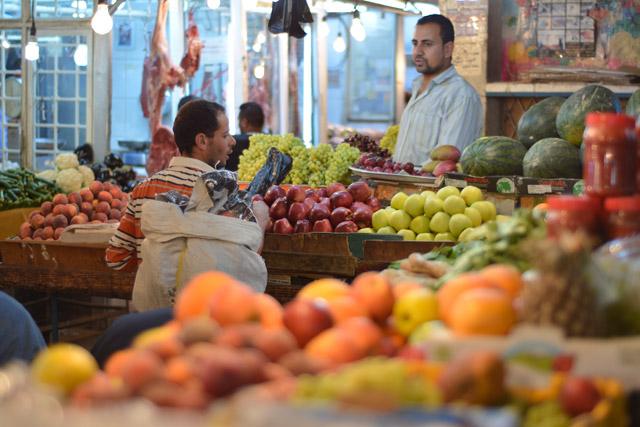You are here
Farmers, exporters urge Gulf countries to delay vegetable ban
By Hana Namrouqa - May 07,2017 - Last updated at May 07,2017

Farmers and exporters said the agricultural sector needs additional time to adjust to the Gulf’s new requirements and standards (Photo by Amjad Ghsoun)
AMMAN — Farmers and exporters on Sunday urged the Gulf countries which imposed a ban on the imports of Jordanian vegetables to delay the starting date of the decision.
They said the agricultural sector needs additional time to adjust to the new requirements and standards.
The appeal of the agricultural sector’s representatives, announced during a press conference, comes in light of a new decision by the United Arab Emirates (UAE) and other Gulf countries to stop the import of several types of vegetables from Jordan for allegedly containing high pesticides residues.
The ministry of climate change and environment in the UAE announced a decision late last month to indefinitely ban the import of seven of Jordan’s main vegetable exports as of mid-May due to increasing levels of chemical pesticide residues found in Jordanian agricultural products.
The banned vegetables include all types of zucchini, sweet pepper, eggplant, cabbage, green beans, cauliflower and lettuce.
The UAE’s decision also stipulated that imports of any fruit and vegetables, besides the aforementioned, be coupled with certificates from the Jordanian Ministry of Agriculture indicating that the produce was free from pesticide remnants.
President of the Jordan Valley Farmers Union, Adnan Khaddam, stressed that despite the agricultural sector’s demand that the UAE and other Gulf countries, such as Kuwait and Qatar, postpone the commencement of the decision, he assured that Jordanian fruits and vegetables are safe.
“If samples of a certain shipment showed that toxicity levels are not within the standards, that doesn’t mean that all of Jordan’s fruits and vegetables are not safe or below standards,” Khaddam said.
He underscored that over 55 countries around the world import Jordan’s produce, which he said are always coupled with lab certificates proving they meet the international standards of exports of fruits and vegetables.
“We also urge the government to tackle the issue through diplomatic channels, as it affects the survival of the agricultural sector,” Khaddam added.
Meanwhile, Saeed Masri, a farmer and former agriculture minister, said that the UAE’s decision does not mean that Jordan’s produce is unfit.
Masri indicating that the UAE announced the decision after changing the code it follows on the toxicity levels in produce, noting that it became much stricter than the international code that Jordan and many countries apply.
Since the UAE announced its decision, the Ministry of Agriculture announced several measures regulating the application of pesticides and the testing of produce for pesticide residues.
Such measures include banning the use of a certain pesticide on some crops, such as eggplant, cauliflower and lettuce among other crops, as well as plans to team up with private laboratories to increase the number of tested samples.
Related Articles
AMMAN — Jordanian exporters of agricultural produce have stopped exporting several types of vegetables to the United Arab Emirates and other
AMMAN — Lab tests “proved” that Jordanian agricultural produce destined for export is “fit for human consumption”, Jordan Food and Drug Admi
AMMAN — Private sector laboratories will soon begin assisting authorities in the testing of fruits and vegetables for pesticide residues, a















